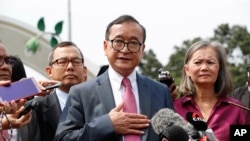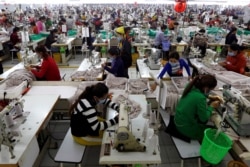Updated at 10:00 am on Nov. 13
The European Union Commission has completed its preliminary report into human rights violations in Cambodia that could lead to a suspension of critical trade privileges, with opposition leader Sam Rainsy saying the pressure of sanctions was working to restore democracy.
The commission completed its report on Tuesday, after a three-month investigation period that ended in August 2019. The report has not been made public and will instead be sent to the Cambodian government, which has one month to send an official response.
Depending on the recommendations of the report, Cambodia could see a temporary suspension of the Everything But Arms' trade privileges, which are critical especially to its garment and footwear exports. An EU Commission statement on Tuesday pointed to Cambodia being the second-largest beneficiary of the EBA scheme, totaling around $5.5 billion in exports.
The statement said the suspension procedures was aimed at addressing human rights violations in Cambodia, adding that substantive changes were needed to avert a suspension of the EBA privileges.
"While the European Union remains committed to working with the Cambodian authorities on this aim, real and credible improvement on the issues of concern is needed in order to avoid the withdrawal of EBA preferences," the statement reads.
On Monday, the European Union responded to a relaxation of the opposition leader Kem Sokha's bail conditions, allowing him to only travel within the country and not overseas. A spokesperson pointed out that it was critical that Kem Sokha needed to freed and that the political rights of all Cambodia National Rescue Party (CNRP) members needed to be restored.
Cecilia Malmström, the EU commissioner for trade, tweeted on Tuesday that there were continuing concerns over the human rights situation in Cambodia.
"We are very concerned about the human rights situation there," she wrote in a tweet. "The Cambodians now have one month to respond and we will make our final decision in [February] next year."
Mina Andreeva, the EU Commission's chief of spokesperson, declined to comment on the contents of the report sent to the Cambodian government. VOA Khmer could not reach Foreign Ministry spokesperson Koy Kuong for comment.
A group of exiled Cambodia National Rescue Party leaders are currently camped in Kuala Lumpur, having missed a November 9 deadline for their planned return to Cambodia. They have faced difficulties entering Cambodia after a few ASEAN members have heeded to Cambodia's request to restrict their movements.
On Tuesday morning, and prior to the EU announcement, CNRP leader Sam Rainsy said the pressure on the Cambodian government, through the threat of suspension of the EBA privileges, was aiding with a restoration of democratic rights in the country, as evidenced by the easing of Kem Sokha's bail conditions.
He said the government should seriously address the democratic backslide to prevent economic turmoil.
"If [the government] doesn't want Cambodia to face an economic crisis, where hundreds of thousands of workers lose their jobs, they must restore democracy," he said from Kuala Lumpur.
Council of Ministers Phay Siphan dismissed Sam Rainsy's comment as mere political rhetoric. But, he said the government was continuing to present its case to the EU, especially using the findings and ground reports issued by other multilateral agencies.
"We are talking about the truth, not about policy. For example, with regards to the rights of the workers, we took the International Labor Organization's reports to show [the EU]. With land grabbing, we will show them all the information," he said, adding that he was confident the EU would not suspend the EBA scheme.
Meas Nee, a political analyst, said that political one-upmanship and confrontational rhetoric between the two parties was not helping address the serious concerns raise by the EU Commission.
"Come and talk to each other," he suggested. "And understand the real situation, that our bickering is not bringing any resolution other than us quarrelling."





